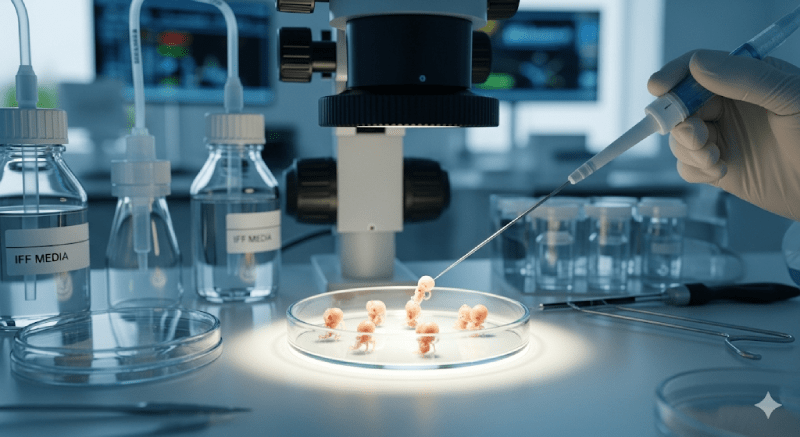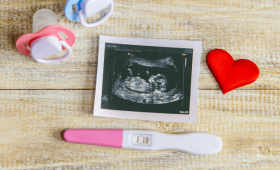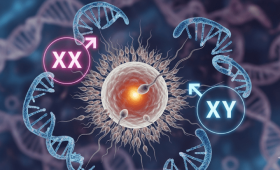Factors that Make Cyprus a Prominent Destination for IVF Treatment
Cyprus stands out as a global attraction for IVF treatment. This is due to a unique legal and logistical framework that offers flexibility and economic advantages. These factors make the region particularly appealing to patients who face restrictions in other countries.
1.1. Legal Framework and Treatment Flexibility
Unlike its southern neighbor, which is a member of the European Union, Northern Cyprus has a more liberal legal structure regarding assisted reproductive technologies. This allows for certain procedures that are not legal in countries like Turkey.
Legality of Donation Procedures: The legality and anonymity of egg, sperm, and embryo donation is one of the most significant advantages offered by Cyprus. Egg donation offers a high chance of success, especially for women with issues such as premature menopause, poor egg quality, or low ovarian reserve. In some clinics, the absence of a waiting list for international patients allows for a quick start to the treatment process. This eliminates the psychological and logistical burden that long waiting periods create for patients.
Gender Selection and Family Balancing: Northern Cyprus is one of the rare places that legally offers gender selection for both medical reasons (preventing sex-linked genetic diseases) and “family balancing” purposes (non-medical). This makes the region a preferred destination for patients from the United Kingdom, Canada, and many EU countries where such procedures are prohibited.
However, the research materials contain an inconsistency on this matter. Some sources state that gender selection with PGT (Preimplantation Genetic Diagnosis) is not legal and can only be performed for genetically transmitted diseases. In contrast, another clinic claims that “gender selection with the MicroSort method is legally available only at their center.” This contradiction indicates that regulatory frameworks may be interpreted differently by clinics or that there may be exceptions based on specific technologies. It is of great importance for patients to explicitly confirm this issue with their chosen clinic. This situation, while providing a “regulatory flexibility” that feeds the international patient market, also creates a potential risk in terms of transparency and standardization.
Age and Marital Status: The legal age limit for IVF treatment in Cyprus is 55 for women (provided they meet certain medical criteria and receive ethical committee approval) and 65 for men. This flexibility increases the chance of treatment, especially for women over 40. Furthermore, there is no legal requirement for official marriage; cohabiting couples can undergo treatment with their mutual consent. This removes barriers for international patients related to marital status.
Embryo Transfer: Northern Cyprus laws permit the transfer of 3 embryos to increase the chances of pregnancy , which is more flexible than the 2-embryo transfer limit in Turkey. This approach theoretically increases the chances of pregnancy, especially for older patients or those with repeated unsuccessful attempts.
1.2. Economic Advantage and Logistical Convenience
Cyprus offers a significant economic advantage in terms of IVF treatment costs compared to countries like the United Kingdom and the United States, with more affordable prices. Prices can range from 2,250 Euro to 10,000 Euro, depending on the patient’s medical condition and the required treatment.
Holistic Medical Tourism: Many clinics in Cyprus combine the treatment process with a “holiday” experience, offering logistical conveniences for patients. These services include airport transfers, accommodation arrangements, and the possibility of completing a portion of the treatment in the patient’s home country. This approach is observed to aim at alleviating the psychological burden of the treatment. The IVF process, by its nature, involves a high degree of stress and emotional fluctuation. There are opinions that stress can physiologically and negatively affect the success of the treatment. The holistic approach and warm atmosphere offered by clinics can be seen as a strategy aimed at indirectly increasing biological success. By reducing the patient’s stress level with logistical and emotional support, the physiological and psychological burden of the treatment is alleviated. This emphasizes that the treatment is not just a medical procedure but that the patient experience and emotional support are also an integral part of success.

Key Clinical and Biological Factors Determining Success
The success of IVF treatment depends on a complex interaction of many factors. These factors cover a wide range, from the patient’s biological characteristics to the quality of the gametes and embryos used.
2.1. Patient-Related Factors
The most significant factors influencing the treatment outcome are directly related to the patient’s own biological condition.
Female Age: The most important single factor affecting success is female age. Research shows that the live birth rate for women under 35 can reach up to 50%, but this rate drops to 14% for women over 40 and as low as 5% for women over 43. As age advances, the number and quality of eggs decrease, which increases the risk of genetic abnormalities (aneuploidy) in embryos and raises the likelihood of miscarriage. Therefore, it is recommended that couples for whom IVF is advised should begin the procedures without delay.
Male Factor and Causes of Infertility: Sperm count, motility, and morphology can affect the IVF success rate. Modern techniques like microinjection (ICSI) provide high fertilization rates (75-80%) even in cases of severe male infertility. However, the chance of success may be lower in men with no sperm in the semen where sperm is retrieved from the testicle. Issues like endometriosis, uterine fibroids, or intrauterine adhesions can also lower the chance of pregnancy. Approximately 20% of all infertility cases are defined as “unexplained infertility.”
Lifestyle and General Health: Lifestyle factors also directly affect success. A high Body Mass Index (BMI) can lead to the need for high doses of gonadotropins, a risk of hyperstimulation syndrome, and lower egg retrieval rates. Habits such as smoking and alcohol consumption also negatively impact the chance of pregnancy.
2.2. Embryo and Uterine Factors
In the biological course of the treatment, the condition of the embryo and the uterus is of critical importance for implantation and pregnancy.
Embryo Quality: Fertilization and embryo development form the basis of success. Poor quality embryos have a lower chance of implanting in the uterus.
Uterine Condition: The structure and thickness of the inner lining of the uterus (endometrium) where the embryo will implant is a significant determinant of success. A thin lining or adhesions from previous surgeries can reduce the chance of pregnancy.
Embryo Transfer Technique: The transfer procedure must be performed cleanly and painlessly. The presence of blood or mucus during the transfer can increase the likelihood of failure and may be an indicator of a subclinical infection or traumatic contact.
The Role of the Clinic and Technology in Success
The success of IVF treatment in Cyprus depends not only on patient-related biological factors but also on the clinic’s experience and the advanced technologies it uses.
3.1. Clinic Experience and Team Expertise
The key to a successful IVF treatment is its execution by a harmonious team of experienced doctors, embryologists, and patient coordinators. The clinic’s success depends on the attention and expertise shown by the team at every stage. Clinics create personalized treatment plans by considering the patient’s medical history, hormone levels, and specific circumstances, rather than using standard protocols. This personalized approach ensures the patient’s active participation in the treatment and makes the process more collaborative. Patient reviews emphasize that the warm, caring, and professional approach of the staff and language support reduce stress during the treatment process and improve the overall experience.
3.2. Laboratory Quality and Advanced Technologies
The quality of the IVF laboratory is one of the most important components of the treatment. Laboratory personnel are responsible for bringing the retrieved eggs and sperm together under conditions most suitable for the body and ensuring embryo development.
Genetic Diagnostic Methods (PGD/PGS/NGS): Advanced clinics have their own genetic laboratories. Genetic tests (PGD, PGS, NGS) performed in these laboratories allow for the analysis of embryos for chromosomal abnormalities. NGS screens all 46 chromosomes, providing more comprehensive and reliable results. The elimination of mosaic embryos and the transfer of only genetically healthy embryos reduce the risk of miscarriage and increase the chance of pregnancy, especially in older women.
Use of High-Tech Instruments: Innovations such as AI-assisted embryo selection analyze subtle developmental patterns that the human eye might miss, identifying embryos with the highest implantation potential. Similarly, Embryoscope systems that monitor embryo development in real-time allow embryologists to make more accurate decisions.
Assisted Hatching (AH): This technique aims to facilitate embryo implantation by thinning the outer shell (zona pellucida). Clinics recommend this method for patients with repeated unsuccessful attempts or for older women. However, meta-analyses in the scientific literature show that there is no strong evidence that AH statistically and significantly increases live birth rates. This reveals inconsistencies between clinical practices and independent scientific research.
Evaluating the Success Rates of Cyprus IVF Centers
For individuals considering IVF treatment in Cyprus, one of the most critical decision-making factors is success rates. However, it is essential to adopt a transparent and critical approach to how these rates should be interpreted.
4.1. Analysis of Declared Rates
Clinics in Cyprus report high success rates that are claimed to be above the world average. Especially in egg donation, high pregnancy rates ranging from 75% to 90% are stated. In IVF with a woman’s own eggs, success rates vary significantly according to the patient’s age. Rates starting at 56% for women under 35 show a dramatic decrease to as low as 14% for women over 40.

Table 1: Declared Average Success Rates in Cyprus by Treatment Type
| Treatment Type | Age Group (Female) | Declared Average Success Rate (%) |
| IVF (Own Eggs) | < 30 | 56-90 |
| IVF (Own Eggs) | 30-34 | 51-86 |
| IVF (Own Eggs) | 35-39 | 45-85 |
| IVF (Own Eggs) | 40+ | 14-79 |
| Egg Donation | All Ages | 75-93 |
| Sperm Donation | < 30 | 59-90 |
| Gender Selection | < 30 | 87-94 |
| IVF (Own Eggs) | 30-34 | 72-89 |
| IVF (Own Eggs) | 35-39 | 65-84 |
| IVF (Own Eggs) | 40-44 | 52-77 |
4.2. Issue of Reliability and Transparency
The political status of Northern Cyprus means that IVF centers are not obligated to report their results and success rates to international monitoring organizations such as ESHRE (European Society of Human Reproduction and Embryology). As a natural consequence of this, it is impossible for an independent body to verify the success rates declared by clinics. When evaluating this data, patients must rely entirely on the clinics’ own claims.
The Difference Between Pregnancy Rates and Live Birth Rates: Success rates presented by clinics usually refer to pregnancy rates. However, live birth rates are generally lower due to the possibility of the pregnancy resulting in a miscarriage. Live birth rates are on average 10% lower than pregnancy rates. This difference is critically important for patients to properly manage their expectations. Approaching high rates with skepticism and questioning the difference between pregnancy and live birth can help to achieve a more realistic picture.
The Treatment Journey: Patient Experiences and Critical Considerations
IVF treatment is not just a medical procedure but also a physically and psychologically demanding journey. This section analyzes the emotional and practical aspects of the process based on patient experiences.
5.1. Synthesis of Patient Reviews
Patient reviews on clinic websites and various platforms reveal the diversity of experiences. Many patients express their satisfaction with the warm, caring, and professional approach of the clinic staff. The continuous support provided by patient coordinators throughout the process, their patience in answering questions, and prompt responses make the treatment journey less stressful. Furthermore, the modern and clean facilities of the clinics and their emphasis on patient privacy help patients feel secure.
However, not all experiences are positive. Some critical comments state that the staff becomes indifferent after payment, that everything is “done for money,” and that a human approach is lacking. This shows how important expectation management and transparency are in choosing a clinic.
5.2. Holistic Approach and Emotional Support
The physical and psychological difficulties of the IVF process are frequently mentioned by patients. Managing emotional fluctuations such as disappointment, sadness, hope, and anger can affect the success of the treatment. The empathy and continuous support of the clinic staff play a critical role in helping patients navigate this challenging process. As one patient commented, clinics should provide not only medical but also great emotional support. This holistic approach helps patients feel like a part of a “family” rather than just a “patient.”
Conclusion and General Assessment
Cyprus offers unique advantages for individuals and couples seeking IVF treatment. These include liberal legal regulations, a wide range of treatment options such as donation and gender selection, high age limits, and a relatively more affordable cost. Additionally, the absence of waiting lists and the combination of treatment with a holiday experience make the process more logistically and psychologically manageable.
However, it is necessary to be cautious when evaluating these advantages. In particular, the success rates declared by clinics, which are not audited by international independent organizations, should be examined with a critical perspective. This is because these rates generally reflect the higher pregnancy rates and are different from live birth rates.
The most important steps for making an informed decision are as follows:
- Conduct Comprehensive Research: Focus not only on success rates but also on the clinic’s laboratory quality, the team’s experience, and patient reviews (both positive and negative).
- Ask Critical Questions: Ask the clinic directly whether their success rates are for pregnancy or live birth, the specific rates for your age group, and for a breakdown of additional costs like medications, genetic tests, and accommodation.
- Evaluate the Holistic Approach: Consider not only the medical technology but also the emotional and logistical support offered. A stress-reducing environment is an integral part of success.
This report aims to provide a roadmap for those seeking IVF treatment in Cyprus and to help them make sound and informed decisions on this important journey.
Table 2: IVF Treatment Cost Components in Cyprus
| Treatment Type | Average Price Range (Euro) | Services Included in the Price | Additional Costs |
| Standard IVF | 2,250 – 4,000 | Egg retrieval, sperm preparation, sedation, ICSI, 5-day incubation, embryo transfer. | Medications, preliminary tests, accommodation, travel. |
| Egg Donation | 4,500 – 7,000 | Donor eggs, sperm preparation, ICSI, 5-day incubation, embryo transfer. | Medications, preliminary tests, accommodation, travel. |
| Embryo Donation | 7,000 – 8,500 | Donor eggs and sperm, ICSI, 5-day incubation, embryo transfer. | Medications, preliminary tests, accommodation, travel. |
| Gender Selection (PGD/NGS) | 5,000 – 8,000 | IVF procedure, PGD/NGS test, embryo transfer. | Additional fee per tested embryo, medications, accommodation, travel. |
Table 3: Legal Comparisons in IVF Procedures
| Legal Regulation | Northern Cyprus | Turkey |
| Maximum Embryo Transfer | 3 embryos | 2 embryos |
| Legal Age Limit (Female) | up to 55 years (under certain conditions) | Legal upper limit varies by clinic, usually up to 45 |
| Marital Status Requirement | Official marriage is not required | Official marriage is required |
| Legality of Donation | Egg, sperm, and embryo donation are legal and anonymous | Egg, sperm, and embryo donation are illegal |
| Legality of Gender Selection | Legal for medical and “family balancing” purposes | Illegal for non-medical reasons |



